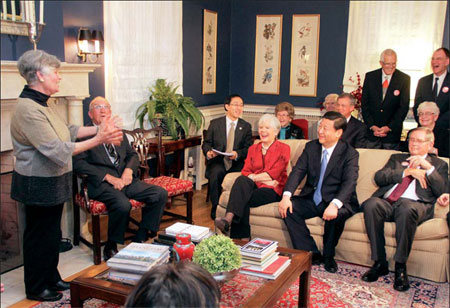Challenging year ahead

For china and europe, it's period for putting their heads together
Chinese Vice-President Xi Jinping will visit two European countries, Ireland and Turkey, next week, following the China-EU summit in Beijing on Feb 14 and several weeks after the German Chancellor, Angela Merkel, was in China.
 |
| Eleanor Dvorchak (left) at the home of Roger and Sarah Lande in Muscatine, Iowa, on Feb 15, talks about the first trip China's Vice-President Xi Jinping (center on sofa) made to the town in 1985. He then stayed with the Dvorchaks. After his five-day trip to the US that ends on Feb 17, Xi will visit Ireland and Turkey. Kevin E. Schmidt / The Quad City Times Via Associated Press |
How these and other China-Europe meeting over the coming year shape the bilateral partnership remains to be seen, but Ding Chun, director of the Center of European Studies at Fudan University, said he expects 2012 will be a smooth year for China-EU relations.
Visits by senior national leaders will help China and European countries gain more mutual understanding, Ding said.
"It's a very good time for Xi to visit European countries, when the eurozone is still suffering from the financial crisis, and major powers, such as France, are going to have elections."
The EU faces many problems that need to be solved within the year, he said.
After disagreements on a series of international matters, such as the crisis in Syria, the Iran nuclear issue and the financial crisis in Europe, cooperation between China and the EU on international issues needs to be improved, he said.
This month when Merkel was on her fifth official visit to China since taking office, one of the critical issues was how China could help solve the European debt crisis. Chinese Premier Wen Jiabao made it clear that China is considering "involving itself more and deeply" in efforts to address the debt issue.
But China alone cannot rescue the EU, Ding said. "We may help, but when all is said and done only they can save themselves. China is taking a very positive attitude for further global engagement, and the growing Chinese economy is making us have to take a more important role in the world, so we need to be very careful about how we handle international issues."
Lou Jiwei, chairman of China Investment Corp, said at the Chinese Economists 50 Forum on Feb 13 that it is difficult for long-term investors to buy European government debt. The world financial market is precariously perched, he said, meaning the most likely investment opportunities are in infrastructure and industrial projects.
Last year Europe became the leading foreign direct investment destination for China with 34 percent of all investments recorded by value, up from only 10 percent in 2010, according to A Capital, a private equity fund for Chinese outbound investment.
Andre Loesekrug-Pietri, founder and managing partner of A Capital, said Europe is becoming "increasingly attractive for Chinese investments, with more than 34 percent of the total, which is very good news with the current eurozone crisis".
Chinese investors are increasingly looking for added value, such as high-end manufacturing, brands and distribution, rather than the usually reported natural resources investments, Loeskrug-Pietri said.
China's domestic economic reform will make China and the EU business partners as well as rivals, said Davide Cucino, president of the European Chamber, during the China-EU summit on February 14.
"As China aims to rebalance its economy through increasing domestic consumption, relying less on exports and opening its economy, this process will bring the economies of the EU and China closer. This will bring synergies, but will also put China and the EU into greater competition together in some areas."
It is crucial that short-term trade irritants be addressed and solved in a spirit of mutual trust and cooperation so as not to jeopardize the strong potential of the future EU-China economic relationship, he said. "By maintaining an eye to the long-term and the potential and significant mutual benefits that could entail, it should be possible for both parties to amicably solve and make progress on the current issues that affect the EU-China relationship in the knowledge that this will bring huge benefits in the future."
There is nothing novel about European companies investing in China, and their relatively robust financial health continues to make it attractive for European businesses regardless of the economic crisis.
As every new year comes, there is never any question about investing in China, said Claudio Facchin, senior vice-president of ABB Group, and chairman and president of ABB China.
"China is and will continue to be one of the most attractive markets globally. Not only because of its size but because of the move from quantity to quality. That is an area that European countries and European companies can support."
Today's Top News
- Xi calls for promoting volunteer spirit to serve national rejuvenation
- Xi chairs CPC meeting to review report on central discipline inspection
- Reunification will only make Taiwan better
- Outline of Xi's thought on strengthening military published
- Targeted action plan to unleash consumption momentum
- Separatist plans of Lai slammed






























